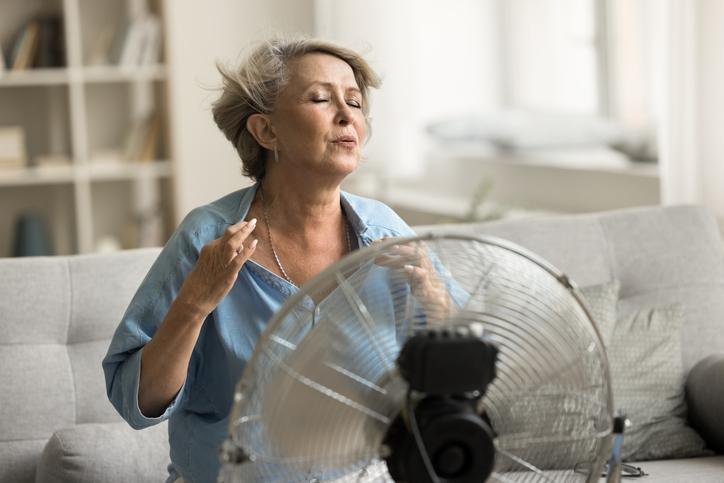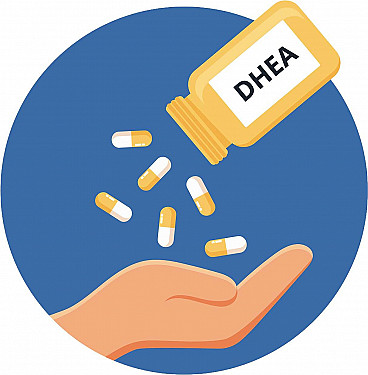Extreme heat endangers older adults: What to know and do
Medications, health issues, and simply getting older can change the way your body copes with soaring temperatures.
- Reviewed by Robert H. Shmerling, MD, Senior Faculty Editor, Harvard Health Publishing; Editorial Advisory Board Member, Harvard Health Publishing

The global rise in temperatures spawns more frequent and intense heat waves. Prolonged or extreme heat poses serious health risks for everyone but is a particular worry for older adults. What steps can you take to manage heat-related risks, especially if you have existing health conditions or take certain medications?
“Understanding risks and recognizing signs and symptoms of heat illness are especially important for older adults,” says Dr. Wynne Armand, a primary care physician at Harvard-affiliated Massachusetts General Hospital, and associate director of the Mass General Center for the Environment and Health.
Why are older adults more likely to be affected by heat?
As we age, our bodies undergo changes that can make it harder to deal with sudden temperature shifts, high temperatures, and heat waves. Several factors contribute to increased vulnerability:
- Reduced ability to sweat: Our natural cooling mechanism — sweating — can be less efficient in older individuals.
- Slower physiological responses: Your body might not signal thirst or recognize overheating as quickly.
- Chronic health conditions: Common conditions, such as heart, lung, or kidney disease and diabetes, can impair the body's response to heat. [Source: CDC]
- Medications: Certain prescription and over-the-counter medications can interfere with temperature regulation or staying sufficiently hydrated.
During periods of extreme heat or prolonged heat waves, these changes can put you in greater danger of developing heat-related illnesses. And in fact, Dr. Armand warns, older adults may run into trouble at lower temperatures than when heat alerts are broadcast.
What is a heat-related illness?
Heat-related illnesses occur when your body can no longer cool itself down effectively. Exposure to excessive heat puts more strain on the body, leading to a spectrum of conditions from moderate discomfort to increasingly severe and even life-threatening emergencies.
Four well-recognized heat-related illnesses are:
- Heat rash: Clusters of red or dark bumps akin to small pimples, often found in skin creases, neck, chest, or groin. Heat rash is caused by excessive sweating in hot, humid weather.
- Heat cramps: Muscle pain or spasms, usually in the abdomen, arms, or legs, that can occur after strenuous activity in high heat.
- Heat exhaustion: A more serious condition that can develop after exposure to high temperatures and inadequate fluid intake. Symptoms include heavy sweating, pale and clammy skin, weakness, dizziness, nausea or vomiting, and headache.
- Heat stroke: The most severe heat-related illness is a medical emergency. Heat stroke occurs when the body's cooling system is overwhelmed. Body temperature can rise quickly to 103° F or higher. Symptoms include hot, dry skin, headache, dizziness, nausea, confusion, and loss of consciousness. Heat stroke can cause damage to the brain and other vital organs.
“The broader impact of heat exposure is not always easy to recognize,” says Dr. Armand. “For example, extreme heat can lead to heart attacks or kidney injury.”
What to do if you recognize heat warning signs
Recognizing the signs of heat-related illness in yourself and others is crucial so you can take prompt action. The CDC and other experts recommend taking the following steps for
- Heat rash: Stay in a cool, dry place. Keep the rash dry and wear loose-fitting cotton clothes. Try anti-itch products such an over-the-counter corticosteroid cream or calamine lotion to soothe the rash.
- Heat cramps: Call a halt on activity and move to a cool place. Drink water or a sports drink and wait for cramps to go away before engaging in any further activity. Get medical help right away if the cramps do not improve within 15 minutes or go away within an hour; if you are on a low-sodium diet; or if you have heart problems.
- Heat exhaustion: Move to a cool place, loosen clothes, and sip water. Take a cool bath, splash cool water on your skin, or put cool, wet cloths on your body. Get medical help right away if you’re throwing up, your symptoms worsen, or your symptoms last longer than one hour.
- Heat stroke: Call 911 right away because heat stroke is a medical emergency. Move the person to a cooler place and lower their temperature with cool cloths or a cool bath. Do not give them anything to drink.
Four ways to beat hot weather
- Dress for success. Wear lightweight, loose-fitting, and light-colored clothing.
- Track local weather through apps and web sites. When possible, avoid being outside in high-heat hours and plan your schedule around this. Keep an eye on the heat index, a mix of humidity and heat.
- Spend hot hours in cool spaces. If you don’t have air conditioning, visit a shopping mall, cooling center, senior center, or public library. Even a few hours in a cool space can help, especially during peak heat hours in the afternoon.
- Use fans correctly. Fans help if surrounding air is relatively cool. If air temperatures are very high, it's important to dampen your clothes or skin to help keep your body from overheating, and move to a cooler location if possible.
Ask your health care team to help you develop a personal hot weather plan, especially if you have chronic health conditions or regularly take medications for your health. For more cooling tips, try these 14 ideas.
What to know about heat if you take medications
Many common medications can affect how your body reacts to heat. Some drugs can reduce sweating, alter awareness of thirst, or increase urination, leading to dehydration. Examples are:
- certain high blood pressure and heart medicines, such as diuretics (water pills), beta blockers, angiotensin-converting enzyme (ACE) inhibitors, and angiotensin receptor blockers (ARBs)
- certain antipsychotic and antidepressant medicines
- certain medicines for Parkinson's disease
- antihistamines.
If you take medication regularly, discuss heat safety with your doctor or pharmacist. They can advise if your medications increase your risk and suggest specific precautions. Do not stop or change prescribed medications without consulting your health care provider.
What to know about heat if you have heart problems
If you have cardiovascular conditions such as heart disease or high blood pressure, be especially cautious during hot weather. Heat places additional stress on the heart. To stay safe:
- Avoid strenuous activities, especially during the hottest part of the day (typically 10 a.m. to 4 p.m.).
- Stay in air-conditioned environments as much as possible.
- Drink plenty of water throughout the day even if you don't feel thirsty, unless your doctor has advised restricting fluids.
What to know about heat if you have lung problems
Conditions like asthma or chronic obstructive pulmonary disease (COPD) can be aggravated by hot, humid air and air pollution, which often worsens during heat waves.
- Pay attention to air quality alerts.
- If you’ve been prescribed a quick-relief inhaler for asthma or COPD, keep it readily available.
- Avoid outdoor activities during peak heat hours.
What to know about heat if you have kidney problems
Kidney function can be compromised by dehydration, a common risk during extreme heat. People with pre-existing kidney disease are more vulnerable.
- Follow your doctor’s specific recommendations for staying hydrated, since fluid needs can vary with kidney disease.
- Be aware of signs of dehydration such as dark urine, urinating less, dizziness, or dry mouth.
- Avoid caffeinated drinks or very salty or sugary drinks, which can contribute to dehydration.
About the Author

Francesca Coltrera, Editor, Harvard Health Blog
About the Reviewer

Robert H. Shmerling, MD, Senior Faculty Editor, Harvard Health Publishing; Editorial Advisory Board Member, Harvard Health Publishing
Disclaimer:
As a service to our readers, Harvard Health Publishing provides access to our library of archived content. Please note the date of last review or update on all articles.
No content on this site, regardless of date, should ever be used as a substitute for direct medical advice from your doctor or other qualified clinician.















